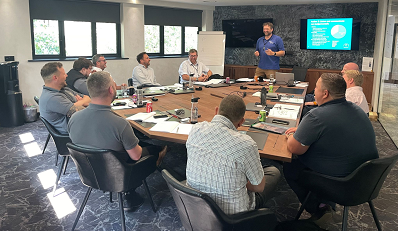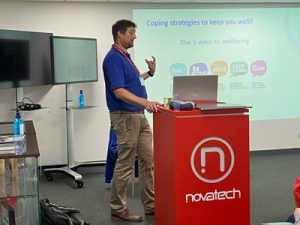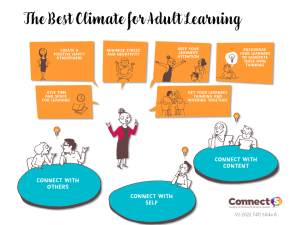
Hampshire, Portsmouth, Southampton and Isle of Wight Councils have commissioned Havant and East Hants Mind to produce a quality framework which provides tools, tips and updates for Mental Health Trainers to ensure there is a consistent approach to the quality control and delivery of the following courses:
Mental Health First Aid
Suicide First Aid
Connect 5
This is a free resource including general updates and recaps, opportunities to attend Community of Practice update events and access to discussion boards. If you have any questions, suggestions or thoughts on the content please email the Havant and East Hants Mind Training Team
 |
A community of practice is a network for professionals to share knowledge, learning and support. There are various options below for each course you are a trainer for, to ensure you can keep up with communication, collaborate and consult with others: |
Mental Health First Aid
As an MHFA instructor you may well be aware that you can take advantage of the benefits offered to MHFAiders ( as below)
Join the Association of MHFAiders.
Subscribe to the MHFA newsletter
Attend a 3 month refresher webinar
We would encourage you also to attend the regional events and regular education sessions offered by MHFA England. You can find these under the CPD section of your MHFA Instructor dashboard. These help you maintain your accreditation in addition to the section below. It’s also a good practice to review the monthly instructor newsletter to keep up to date on new developments. This can also be found in the resources section of your dashboard.
Suicide First Aid
It is important as a trainer to maintain your Approved Associate Tutor status by attending at least two SFA CPD events within each financial year, this enables you to gather updates, refresh and maintain satisfactory occupational competencies as required by C&G.
There is also a requirement to purchase and utilise the updates/revised manuals when produced.
Connect 5 – Havant and East Hants Mind will be chairing three community of practice online events for any Connect 5 trainers in Hampshire. These will be for 1.5 hours over selected dates and will allow trainers to share good practice, discuss delivery and collaborate with other trainers.
A second Connect 5 trainer COP date will be added soon – keep a look out!
This will be chaired by a HEH Mind lead Connect 5 trainer, accompanied by two workplace wellbeing practitioners (also C5 trainers)
To book your place please follow the link to access the eventbrite booking page
 |
Understanding the three Connect 5 trainer hats
|
Encouraging delegates to introduce themselves at the beginning of each course, highlighting their roles within their workplace and sharing their knowledge of the subject matter, is a valuable practice. This approach allows trainers to tailor the training course to the appropriate level and ensure relevance to all delegates’ needs. By understanding the diverse backgrounds and expertise of the participants, trainers can effectively engage them and deliver content that meets their specific
It is essential to dedicate time at the beginning of each training course to highlight the goals and objectives. By spending 10 minutes to outline the main aims of the course or workshop, trainers can effectively set expectations and provide instant structure to the training session. This practice ensures that participants understand the purpose of the course and what they can expect to achieve, ultimately enhancing their learning experience and engagement
Mastering the skill of interpreting non-verbal cues from delegates can significantly enhance training effectiveness. Trainers who adopt a “sense and respond” approach are better equipped to understand the needs of their audience and adjust their training delivery accordingly. If delegates appear confused, tired, or bored, it is crucial to take proactive steps to address the issue promptly. This may involve taking a break, increasing engagement, or initiating dialogue to rectify the situation and ensure optimal learning outcomes for all participants.
It is important to acknowledge that training can be physically and mentally tiring for both trainers and delegates. If there are signs of tiredness from the audience, it is advisable to recommend a quick break to allow participants to recharge. By creating a dynamic and interactive learning environment, trainers can help combat fatigue and keep participants actively engaged throughout the training session.
Repetition can be a powerful tool in emphasising key points throughout a course. Don’t hesitate to repeat important information on multiple occasions to ensure that it resonates with participants. It can be beneficial to explicitly announce your intention to repeat certain points to further highlight their significance.
Integrating light-hearted moments into a training session can help dispel tensions and create a more engaging and positive learning environment. However, it is important to strike a balance and ensure that these moments do not belittle the content or the purpose of the training course. By incorporating humour thoughtfully and respectfully, trainers can foster a relaxed atmosphere while maintaining the focus on the course objectives and content. This approach can enhance participant engagement and overall learning outcomes.
Creating a stimulating environment with good lighting and ambience is crucial for a positive learning experience. Avoiding stuffy, overcrowded rooms with poor ventilation can significantly impact participants’ engagement and comfort levels. Opting for a venue that provides ample natural light, fresh air, and a pleasant atmosphere can enhance the learning environment and make the training session more enjoyable for delegates. A well-chosen venue contributes to better learning outcomes and overall satisfaction among participants.
Controlling the pace of each training course is crucial for a successful delivery. Rushing through slides too quickly or finishing significantly early can lead to disengagement from delegates. Similarly, running out of time with a substantial amount of content remaining can result in incomplete learning objectives. It is advisable to be well-versed in the course content and plan approximately how many slides to cover per hour to track progress effectively. Being prepared to adjust the pace subtly throughout the course allows for a balanced distribution of content within the allocated time frame, ensuring a productive and engaging training experience for all participants.
Standing in front of your audience during a course can convey confidence, leadership, and dynamism. While it may not always be feasible to stand throughout the entire session, incorporating moments of standing can positively impact how you are perceived by your audience.
It is important to acknowledge that as a trainer, there may be instances where you encounter questions for which you do not have the right answer. In such situations, it is best to openly admit when you are unsure, being transparent about your limitations and committing to finding the correct information or seeking assistance, you can maintain credibility and trust with your delegates.
Addressing delegates by their first names can indeed foster a stronger bond between the trainer and the group. In situations where delegates do not have name badges, creating a quick sketch of the room layout and noting down names next to each delegate’s seating position can be a helpful strategy. This allows the trainer to easily refer to the sketch during the session, ensuring personalized interactions and enhancing engagement with the participants.
Get mental health help – NHS 111
Samaritans call free 116123 available 24/7
Shout text SHOUT to 85258 available 24/7
Hard Hat (construction specific) text HARDHAT to 85258 available 24/7
Lighthouse Club (construction industry helpline) – 0345 605 1956
Adults’ Safe Haven – Havant & East Hants Mind 0300 303 1560 available 6-10pm. A drop-in service is also available during these times
North & Mid Hampshire Safe Haven Andover Mind 0300 303 5772 available 6-10pm. A drop-in service and virtual appointments is also available during these times
Southwest Hampshire Safe Haven a crisis drop-in service by Solent Mind, The South West Hampshire ICB and Southern Health Foundation Trust 07974 124873 available 5-10:30pm – text, drop-in service and virtual appointments is also available during these times
Central Hampshire signposting website for mental health and wellbeing
iTalk – Talking Therapy for people registered with a GP in the following areas of Hampshire: Alton, Andover, Basingstoke, Bordon, Eastleigh, Fareham, Gosport, Havant, New Forest, Petersfield, Romsey and Winchester. You can self-refer online or by telephone 023 8038 3920.
Talk Plus Talking therapy available to people who are registered with a GP in the following areas of Hampshire: Yateley, Fleet, Farnborough, Blackwater, Aldershot or Farnham. You can self-refer online or telephone 01252 533355.
Inclusion recovery Hampshire offers support with drug and alcohol issues. Those aged 24 and under can call 0845 459 9405. Those aged 25 and over can call 0300 124 0103.
Mind runs wellbeing centres in Hampshire towns to provide short-term, outcome-focused support. The centres provide workshops, courses and other support on many mental health issues. Contact your nearest centre to find out more about their programme:
Andover Mind covers Farnborough, Andover, Basingstoke and Romsey – 01264 332297
Solent Mind covers Eastleigh, Fareham, Gosport, New Forest and Winchester – 023 8202 7810
PCC – Adult Mental Health support
PCC – Mental Health services and resources
Mental Health Services for Adults
Get mental health help – NHS 111
Two Saints IOW 01983 520168 available Mon-Fri 5-10pm and weekends Noon-10pm. Email and drop-in service is also available during these times
Local directory of services and events
Community mental health support hub pages
Warm spaces and support (cost of living)
Wellbeing support Isorropia Foundation
Osel, employment advice and support to individuals with mental health conditions
Samaritans 116 123, call: 0330 094 5717, 52 South Street, Newport IW PO30 1JQ
Safe Haven 7 High Street Newport, PO30 1SS Call: 01983 520168, email safehaven@twosaints.org.uk
Age UK Isle of Wight Contact 01983 525282, email gns@ageukiw.org.uk
Cruse Bereavement Support offers a free and confidential support service to anyone affected and bereaved by suicide, or suspected suicide in Hampshire, Southampton, Portsmouth and the Isle of Wight.
Hub of Hope is the UK’s leading mental health support database. It is provided by national mental health charity, Chasing the Stigma, and brings local, national, peer, community, charity, private and NHS mental health support and services together in one place for the first time. Hub of Hope provides a comprehensive list of services available in your area.
Citizens Advice a nation wide service with local offices providing free support and advice.
No Limits – Young People offer free information, advice and help to children & young people under the age of 26 in Hampshire, the Isle of Wight, Portsmouth and Southampton. Whatever your issue, whether it’s around mental health, housing and homelessness, sexual health, substance use, money, or anything else, our trained youth workers are available to support, advise and educate you, helping you to grow in confidence, manage your life and build a brighter future.
Samaritans Whatever you’re going through, a Samaritan will face it with you. We’re here 24 hours a day, 365 days a year. Call 116 123 for free.
Calm stands together with everyone who’s struggling with life, no matter who they are, where they’re from or what they’re going through. And we do it through our life-saving services, national campaigns, and by building communities.
National suicide prevention is an alliance of public, private and voluntary organisations in England who care about suicide prevention and are willing to take individual and collective action to reduce suicide and self-harm, and support those bereaved or affected by suicide.
Help is at hand provides support for people bereaved through suicide or other unexplained death, and for those helping them.
Resources for survivors provides reading material about the experiences of others to help them feel less alone, to understand more about what is happening and be aware of what help is available.
Support after suicide vision is that everyone bereaved or affected by suicide is offered timely and appropriate support.
NHS Self Help 5 steps to mental wellbeing. Evidence suggests there are 5 steps you can take to improve your mental health and wellbeing. Trying these things could help you feel more positive and able to get the most out of life.
NHS Quiz How are you? Get a free personalized health score when you complete this 10 minute quiz. How Are You is for over 18s only and is only designed to point you in the right direction. It’s not a medical assessment – if you’re worried about your health you should speak to a health professional.
Every mind matters Find your little big thing for your mental health. There are little things we can all do to lift our mood or ease our anxiety – we need to find what works for us. This could be as simple as taking a walk in nature, prioritising our sleep or opening up to a friend. Our little thing, if we keep doing it, will make a big difference to how we feel.

For more information about all our training courses, please click the link below.
Find out more
If you have energy, experience and enthusiasm and want to make a difference in people's lives.
Find out more
With your help we can make a real difference in people's lives. Make a donation today.
Find out more